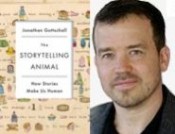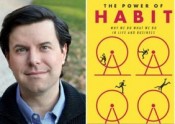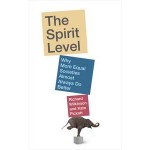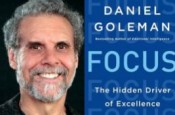Q&A: JONATHAN GOTTSCHALL, Author – THE STORYTELLING ANIMAL: How Stories Make Us Human
Written on May 23rd, 2014 |
Aired 12/02/12
Last July in an interview with Charlie Rose, President Obama said that “the mistake” of the early years of his presidency was his failure to be a better storyteller.
“The mistake of my first couple of years was thinking that this job was just about getting the policy right. And that’s important, but the nature of this office is also to tell a story to the American people that gives them a sense of unity and purpose and optimism, especially during tough times.” In a second term, he said, he would “spend more time with the American people, listening to them, but also being in a conversation with them about where do we go as a country?”
This week’s show is not about Obama or politics. It’s about story and narrative. My guest is JONATHAN GOTTSCHALL author of THE STORYTELLING ANIMAL.
The late evolutionary biologist Steven Jay Gould called humans “the primate who tells stories…” And it’s not just Gould. Anthropologists have found societies that have existed for millennia without the wheel, but they’ve never found one that doesn’t tell stories.
My website leads with a quote: “On the radio, I tell stories of a world that just might work. As a consultant, I help you tell yours.” Building on time as a teacher, two decades in the entertainment industry, and 15 years of radio interviews, I help non-profits, foundations, public agencies, and businesses to tell better stories and build better narratives.
I’m eager to learn from Jonathan what the latest science has to tell us. Why is narrative so powerful? What is its evolutionary value? And can what we’re learning help us get even better at tapping its power?
Q&A: CHARLES DUHIGG – THE POWER OF HABIT
Written on May 16th, 2014 |
Aired 08/26/12
Humans are not alone in being creatures of habit, but can we do anything about it?
Brain science has learned a lot about habits over the last few years. On the one hand, that gives corporations new power with which to manipulate us, but it also gives us greater power over our own behavior.
What is a habit? Are habits positive – a sign of cultivation and industry, or negative, a sign of weakness and mindlessness? Or are they neutral, their value up to us?
Today’s guest, CHARLES DUHIGG an award-winning reporter for the New York Times, has written the best-selling THE POWER OF HABIT: Why We Do What We Do in Life and Business. He tells us that at its most basic level, a habit is a simple neurological loop: a cue (my mouth feels gross), a routine (I should brush my teeth), and a reward (ahhh, minty fresh!). Backing out of the driveway, replying to emails, running before work – many of our most basic daily actions are not, in fact, the products of well considered decision-making, but outgrowths of habits we often don’t even realize exist.
We’ll talk about what a habit is, how they are formed, and how we can put what we’ve learned about habits into practice, so that we are at least somewhat their masters rather than their slaves.
We will also discuss Duhigg’s investigative New York Times series on Apple, including their labor practices and why they don’t manufacture in the U.S.
Q&A: RICHARD WILKINSON & KATE PICKETT, Authors – The Spirit Level: Why More Equal Societies Almost Always Do Better
Written on March 2nd, 2014 |
Originally Aired: 01/31/10
RICHARD WILKINSON & KATE PICKETT authors of an important new book: The Spirit Level: Why More Equal Societies Almost Always Do Better
In the UK, the Guardian says The Spirit Level “might be the most important book of the year, and The New Statesman named it one of the top ten books of the past decade.
Based on thirty years’ research, The Spirit Level shows that unequal societies are bad for the well-off as well as the poor, when it comes to health and social problems, child well being, life expectancy, infant mortality, obesity, educational scores, drop out rates, illegal drug use, mental illness, homicide, incarceration, CO2 emissions, recycling, social mobility, innovation, and levels of trust.
The good news: If all these ills are related to one measure – income inequality, then, decreasing inequality should be the central goal of our politics because we can be confident that it works.
RICHARD WILKINSON has played a leading role in international research on inequality. He studied economic history at the London School of Economics before training in epidemiology, and is Professor Emeritus at the University of Nottingham Medical School and Honorary Professor at University College London.
KATE PICKETT is a senior lecturer at the University of York and a National Institute for Health Research Career Scientist. She studied physical anthropology at Cambridge, nutritional sciences at Cornell and epidemiology at Berkeley before spending four years as an Assistant Professor at the University of Chicago.
Free Forum Q&A- DANIEL GOLEMAN FOCUS: Hidden Driver of Excellence
Written on January 21st, 2014 |
Aired: 01/19/14
I don’t have to tell you how many messages, interruptions and distractions you are inundated with every day. Add to that the stress placed on so many of us by the many roles we play everyday – parent, partner, friend, worker, citizen. The very critical skill or quality of attention is under siege.
DANIEL GOLEMAN, the psychologist, journalist, and best-selling author who wrote the book on Emotional Intelligence, has a new book, Focus: The Hidden Driver of Excellence. In it, he delves into new, surprising findings from neuroscience labs and explains why attention is a little-noticed mental asset that makes a huge difference in how well we find our way in our personal lives, our careers, and in virtually everything we do. Like a muscle, use attention poorly and it withers; work it in the right way and it strengthens. But Goleman doesn’t only consider the personal need for attention but also the way evolution has presented humans a challenge when it comes to dealing with long term threats like climate change.
Free Forum Q&A: SARAH VanGELDER Editor-in-Chief, YES! Magazine 10 Hopeful Things That Happened in 2013
Written on January 7th, 2014 |
Aired 01/05/14
These days the media are full of lists – the best and worst of 2013 – movies, TV, music, books, etc. as well as lists of resolutions and tips for 2014. So when I got an email from SARAH VanGELDER, co-founder and editor-in-chief of YES! Magazine, in which she wrote. “I just posted my end-of-year column on the stories from 2013 that could make 2014 transformative,” , I invited her to join me today. She actually titled her article, “10 Hopeful Things That Happened in 2013 to Get You Inspired for What’s to Come,” and that sounds like a great conversation to start the new year.
We’ll look back and ahead with an eye toward catching the waves or the winds of change, building on the best of last year to make 2014 even better. Let’s commit to taking action to move us all a bit closer to a world that just might work.
